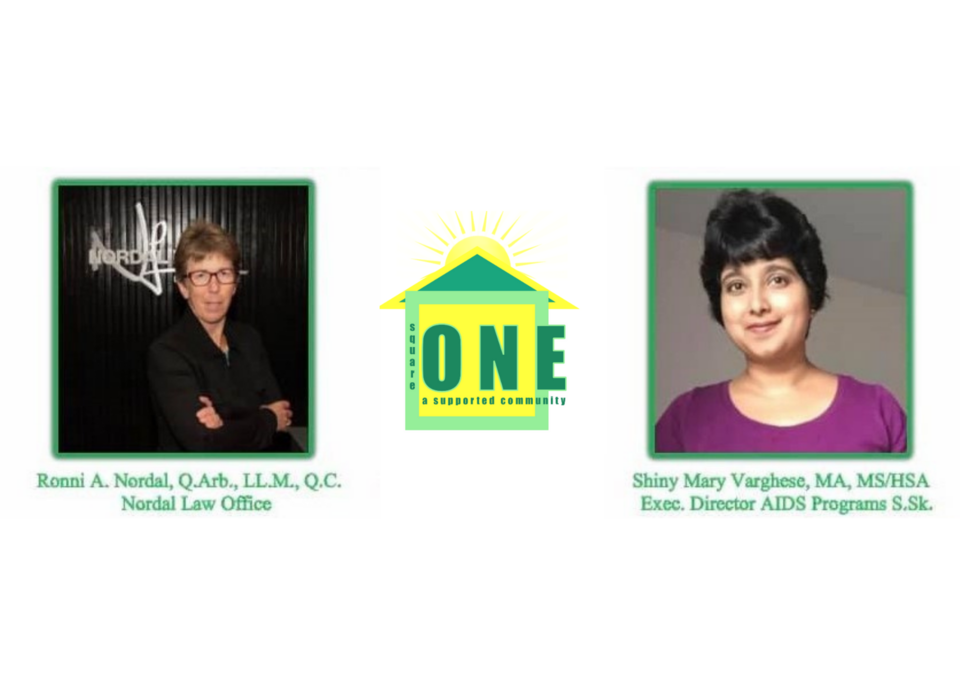The second installation of the Lunch n’ Learn series from Square One Community welcomed two local guests on May 4 to talk about how harm reduction strategies can be beneficial to the recovery process for individuals with addictions.
The presentation series is a new initiative from the non-profit organization, which aims to help educate attendees about the various barriers that affect homelessness while also raising funds for Square One initiatives.
Ronni Nordal opened the presentation, sharing her opinions about the benefits of harm reduction strategies as a parent to someone with an addiction and an active advocate calling for progress on the addictions crisis in the Regina area.
For Nordal, harm reduction is a useful tool to utilize in the journey of recovery, as every individual has a different path they need to take.
“Recovery, to me, means the process of receiving support and treatment that an individual needs to learn how to deal with the issues that are causing them to use substances,” said Nordal. “I believe recovery is a continuum and it is individualized, not one-size-fits-all.”
Harm reduction strategies like reducing substance use or encouraging safe use can offer sometimes necessary supports that can help individuals take a step towards complete abstinence.
“We cannot put on rose-coloured glasses and pretend that everyone has all the supports and resources available to them to get what they need,” said Nordal. “I see harm reduction as helping to change the daily reality [of people] to work with them so they can have hope and then move along the recovery continuum.”
The Saskatchewan Coroners Service recently released a report detailing the suspected drug toxicity deaths in the province as of April, reporting that Saskatchewan has seen nearly double the deaths in the first three months of 2021 as were reported for all of last year.
Further studies have also shown that harm reduction opportunities of varying levels have improved hospitalization outcomes and reduced healthcare costs, said Nordal, which indicates that these strategies are beneficial to the overall situation.
Shiny Varghese, executive director of the AIDS Programs Southern Saskatchewan, shared details about the harm reduction programs in operation in Regina and how they are positively affecting clients.
Just over 6,400 clients utilize services from APSS, said Varghese, which operates a safe needle exchange program, providing clean needles, injection equipment and inhalation supplies as well as opportunities for safe disposal of used syringes.
The program reduces needle sharing or reusing injection or inhalation equipment, to help lower the transmission of bloodborne diseases like HIV and hepatitis. It also provides Naloxone kits and training to help reduce potential overdoses — with over 2,300 kits distributed last year and 1,200 of those kits used in an overdose situation.
Over the past year, APSS distributed 1.3 million needles through its needle exchange program, with a return rate of 91 per cent of needles for safe disposal.
The organization also provides testing services and addictions referrals, and staff offer education on harm reduction and recovery and counselling, with the goal of protecting both individual clients and the community as a whole.
“Our staff are always looking for opportunities to build a personal relationship with clients, to provide answers to questions about drug paraphernalia or offer harm counselling, but also to refer people to agencies or programs that will be helpful to them,” said Varghese.
Additionally, Varghese said the number of conversations about harm reduction with clients increased by more than 50 per cent from last year, and APSS even began offering food items as clients were struggling with food security due to pandemic closures.
Varghese shared that many clients express their appreciation for the exchange site, as it offers a safe service that is free and accessible.
“Some of them don’t like coming here because of the stigma that is associated with injection drug use, [but] we don’t force anybody. We provide the education and ultimately, at some point, some of them want to turn their life around,” said Varghese. “Being confidential, being nonjudgemental makes it easier for [some people] to open up about their using, [and] then we try to find out how to best address the issue and best support that client.”
Many current recovery programs rely on the assumption that an individual has outside support such as family, concluded Nordal, which isn’t always true. The journey to recovery can be affected by many different factors, some of which are exacerbated by homelessness.
Effective harm reduction strategies have to be offered at varying levels, agreed Nordal and Varghese, to impact individuals working on their addiction recovery.
For example, using harm reduction as a strategy would be most effective if more than just abstinence-based programs are offered — like supervised consumption sites and clean supplies programs, but also other programs addressing more basic needs like housing support, social activities and access to counselling.
“We have to look at recovery as a continuum, and people will fall in a variety of places along that continuum, but there is always a place for efforts to reduce harm,” said Nordal. “To assume someone should go down the recovery continuum without considering where they are truly at is a societal problem [and] not everyone is going to move in leaps and bounds, so the key is to have those resources and supports available.”
For more information about the AIDS Programs South Saskatchewan, visit their website at aidsprogramssouthsask.com.
Moose Jaw residents have access to harm reduction services through public health at Crescent View Clinic, including a needle exchange and inhalation supply program, take-home Naloxone kits, HIV, hepatitis and STI testing, a methadone clinic, and education and information services.
The Lunch n’ Learn series from Square One Community will continue on June 8 at noon, with a presentation from Mary Lee Booth, campaign coordinator for the Moose Jaw Crystal Meth Strategy Committee, titled “Spread the Word on Meth.” This session in the series is free to attend, with donations welcome, and those interested can register in advance by emailing [email protected].




